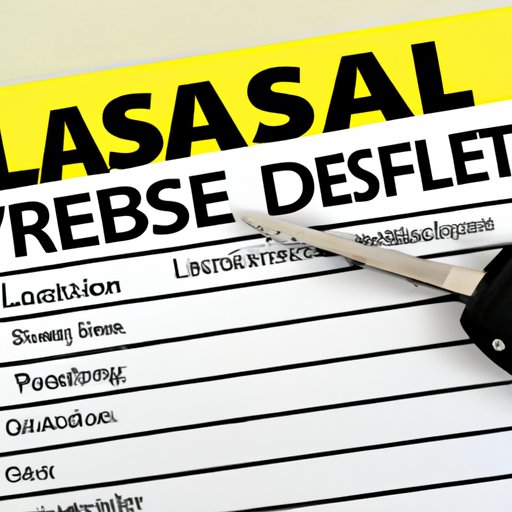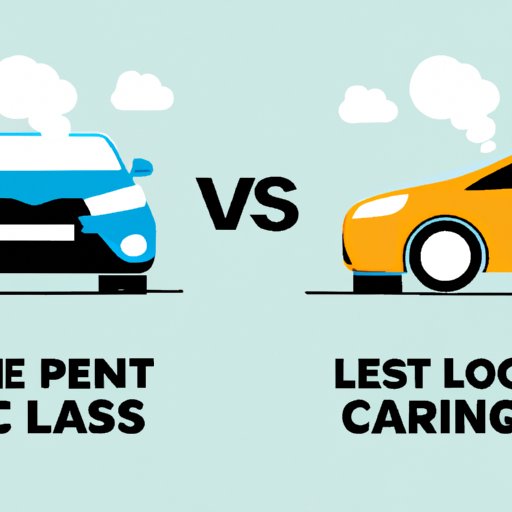Introduction
If you’re in the market for a new car, but don’t have the cash to buy one outright, car leasing may be an attractive option. Car leasing allows you to drive a new car without having to pay the full purchase price upfront. Instead of buying a car, you’ll enter into an agreement with a dealership or leasing company that allows you to pay for the use of the vehicle over a set period of time.
In this article, we’ll explore how car leasing works and discuss the associated fees, pros and cons, eligibility requirements, and more.
Explaining the Basics of Car Leasing
What is a Car Lease?
A car lease is a contract between a lessee (the person who will be using the car) and a lessor (the dealer or leasing company). The contract outlines the terms of the agreement, including the length of the lease (typically 2-4 years), monthly payments, mileage limits, and other details. During the lease period, the lessee has the right to use the car, but does not own it. At the end of the lease, the lessee must return the car to the lessor.
How Does It Work?
Car leasing works like this: the lessee pays a one-time security deposit, followed by monthly payments over the course of the lease. The monthly payments are typically lower than they would be if the car was purchased outright. At the end of the lease, the lessee has the option to either return the car to the lessor or purchase it for its residual value (the estimated value of the car at the end of the lease).
Breaking Down Common Fees and Charges Associated with Car Leasing
Security Deposits
Most car leases require a one-time security deposit, which is usually equal to one or two months’ worth of payments. This deposit is refundable at the end of the lease, provided there are no damages to the car or outstanding payments due.
Monthly Payments
The monthly payment amount is determined by several factors, including the cost of the car, the length of the lease, and any applicable taxes and fees. Generally speaking, the longer the lease, the lower the monthly payments.
Maintenance Fees
Most car leases include some type of maintenance fee, which covers the cost of regular services such as oil changes and tire rotations. Some leases also include coverage for unexpected repairs.
Mileage Caps
Most car leases come with a specified mileage limit, usually 12,000-15,000 miles per year. If the lessee exceeds this limit, they may be subject to additional fees.
Early Termination Fees
If the lessee decides to terminate the lease before the end of the term, they may be required to pay an early termination fee. This fee can vary depending on the length of the remaining lease term and other factors.
Other Fees
In addition to the fees mentioned above, car leases may also include other charges, such as registration fees, taxes, and insurance costs. Be sure to ask about all applicable fees before signing the lease agreement.
Comparing Car Leasing to Other Financing Options
Loan vs. Lease
When deciding whether to lease or finance a car, it’s important to consider the differences between the two options. With a loan, you’ll own the car once the loan is paid off. With a lease, you’ll never own the car; you’ll merely be paying for the right to use it for a set period of time. Additionally, the monthly payments for a lease are typically lower than those for a loan, since you’re only paying for the portion of the car’s value that you use during the lease term.
Credit Score Requirements
The credit score requirements for car loans and leases are generally similar. According to Experian, “the average credit score for a new-car loan was 718, and 672 for a used-car loan. For leases, the average score was 717 for new cars and 658 for used.” 1
Down Payments
Most car loans require a down payment, while most car leases do not. Some leases may require a security deposit, but this is typically much lower than a typical down payment.

Understanding the Pros and Cons of Car Leasing
Pros
There are several benefits to leasing a car:
- Lower monthly payments than with a loan
- No need for a large down payment
- Ability to upgrade to a newer car more frequently
- Potential tax savings
Cons
Leasing a car also has some drawbacks:
- You never actually own the car
- Higher total cost of ownership over the long term
- Restrictive mileage caps
- Potential early termination fees

Determining Your Eligibility for a Car Lease
Before signing a car lease, it’s important to make sure you meet the eligibility requirements. Generally speaking, car leasing companies will look at your credit score, income, employment history, and ability to make a down payment.
Credit Score
Most car leasing companies require a minimum credit score of 600-650. However, some companies may require a higher score.
Income
Most companies require a minimum annual income of $20,000-$25,000.
Employment History
Most car leasing companies require at least two years of steady employment.
Down Payment
Some car leasing companies require a down payment, while others do not. Be sure to ask about this requirement before signing the lease agreement.

Evaluating Different Car Leasing Deals and Offers
Researching Different Offers
Once you’ve determined your eligibility for a car lease, it’s time to start researching different offers. Compare the monthly payments, mileage limits, and other features of each offer to determine which is the best fit for your needs.
Calculating Total Cost of Ownership
It’s important to remember that the total cost of ownership for a leased car is typically higher than it would be if you bought the car outright. To get an accurate estimate of the total cost of ownership, add up the monthly payments, any applicable taxes and fees, and the cost of any additional services such as maintenance and repairs.
Negotiating Terms
Once you’ve found a leasing offer that meets your needs, it’s time to start negotiating the terms. Be sure to ask about any potential discounts or incentives that could lower your monthly payments or total cost of ownership.
Conclusion
Car leasing can be a great way to get into a new car without breaking the bank. As long as you understand the associated fees, pros and cons, and eligibility requirements, you can find a lease agreement that works for you. Be sure to research different offers, calculate the total cost of ownership, and negotiate the terms to ensure you get the best deal possible.
1 Experian. “Average Credit Scores for Approved Automotive Loans Reach All-Time Highs” (2020) https://www.experian.
(Note: Is this article not meeting your expectations? Do you have knowledge or insights to share? Unlock new opportunities and expand your reach by joining our authors team. Click Registration to join us and share your expertise with our readers.)
